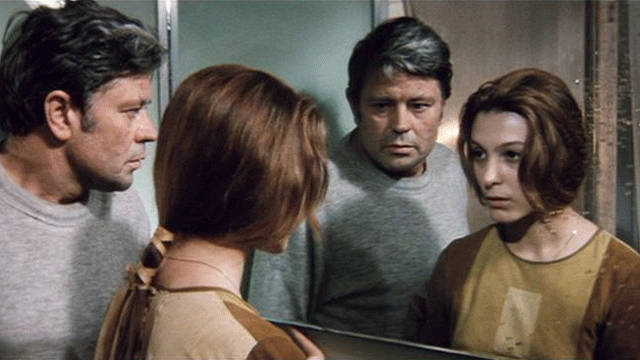Solaris (1972), by acclaimed Russian filmmaker Andrei Tarkovsky, is an excellent example of the growing existentialist sentiment. While ostensibly a science-fiction film set on a distant space station, it is a deeply introspective film, considering the limitations of humanity and examining the individual’s place in the universe.
Solaris is the powerful, mysterious planet at the heart of the film. Attempts to understand its phenomena have been unsuccessful, but the true consequences of the Solaris mission are not completely until psychologist Kris Kelvin, the film’s protagonist, is summoned to the space station to investigate the death of one scientist and the inconsistent behaviour of the others. Soon after his arrival, the planet reincarnates his long-dead wife, Hari. However, it becomes clear that she does not recall her marriage to Kelvin, despite her dependance on his presence; in one scene, when Kelvin leaves the room, Hari tears down a door, unwilling to be left behind. Tarkovsky, through Hari’s physical presence and the episodes that prove the existence of her emotions, challenges the definition of humanity.
Moreover, the doomed mission also questions the limitations of humanity. Tarkovsky presents the mission as a reckless pursuit of knowledge that is ultimately unattainable—a Faustian folly. According to legend, Faust was frustrated by the limits of human knowledge and power and, as such, sold his soul to the Devil. In the bargain, Faust would die and lose his soul to the Devil once he reached the zenith of human happiness; with his new-found omnipotence, however, Faust believed he could never be satisfied, and would therefore live forever. This Faustian tension between celestial and earthly power is clearly evident in Solaris. The circle, a powerful symbol for infinity and divinity, is a key metaphor in the film, especially in the architecture of the space station. Even the etymology of ‘Solaris’ suggests the sun, or a ring of light. Snaut’s maddening lap around the perimeter of the space station epitomizes the circular theme—his path is infinite, and he simply returns to his starting point. Indeed, Snaut has begun to abandon the recklessness of science for poignant existentialism: he even chooses the windowless library for his birthday ‘party’ because it is the farthest removed from Solaris. “We don’t need other worlds,” cautions Snaut. “ We need a mirror […] the happiest people are those who aren’t interested in cursed questions.”
Ultimately, Solaris is a reaction against the cult of science that had fuelled Modern ideologies. In our thirst for future utopias, we had lost touch with our own humanity and our own memories. At the end of the film, Kelvin appears trapped in a reincarnated memory on the surface of Solaris; it is a validation of personal experience, and its triumph over the relentless pursuit of knowledge. Solaris, therefore, effectively captures the essence of the Postmodern zeitgeist and its nascent desire for self-actualization. →
